#fisheries biologist
Explore tagged Tumblr posts
Text

i feel like warmouth are an underrated sunfish… so pretty

here is one i photographed a little over a year ago
#warmouth#sunfish#nature#wildlife#native fish#freshwater fish#fisheries#fishing#conservation#biology#field biologist#wildlife photography#fish#fishblr#ichthyology
65 notes
·
View notes
Note
Hello! I found your blog thanks to Goombanna's video and noticed you are an actual honest to goodness marine biologist in your bio. As someone who is interested in the field, would you mind telling me about your journey becoming a marine biologist? What steps you had to take along the way, what challenges you had to overcome, and where you are now with your career. Would you recommend it to someone who is interested in the current climate? Are there caveats or dangers to be aware of?
Hello! I'm so happy you came to follow me after Goombanna made her fun video. I'm always so excited to talk to people are into marine bio and want to learn!
So, yes, I'm a marine biologist - I currently work at a non-profit doing research and outreach about seafood and the fishing industry. It's very people-centered, and our research spans a lot of topics and facets of fishing and conservation and fishery management. I do get to go out to sea, but a lot of my job is reading and writing, believe it or not! I've done a full break down of advice I'd given two other budding marine biologists here. And also some real "benefits to being a marine biologist" here lol. So that should cover at least some of the info you want! But, let me go through your questions best I can anyway: As someone who is interested in the field, would you mind telling me about your journey becoming a marine biologist? What steps you had to take along the way, what challenges you had to overcome, and where you are now with your career.
I don't mind at all. TL:DR - there are no "steps". Sorry. Being 100% honest - I threw shit at the wall until something stuck and I didn't give up doing that until it did. Anyway... I've always been into marine bio - my favorite animals have been sharks since forever (and before that, my sister and I loved Free Willy, so Orcas, too). And my parents encouraged it because my mom is nuts about animals, too (although she likes to think she's Snow White and feeds anything that breathes, but I digress). So they and my grandparents got me the books and took me to aquariums and stuff. In Highschool, I did what I thought made sense - I took as many electives as I could in marine-bio adjacent topics and bio and science in general, like Chemistry. I didn't have anyone who could tell me "the way", so I like, stumbled around a lot?
When I went to college, I majored in Marine Vertebrate Biology because my goal was to be a researcher for sharks (I also minored in Environmental Studies, which was a good call, because I *really* understand climate now.) (Take climate classes - the ocean and atmosphere are entwined and you will have galaxy brains.) But as I got deeper into it, I started expanding my focus to all fish and marine invertebrates, like crabs and lobsters. I started thinking Fisheries was where I should be... If you wanna see my career journey (that doesn't include working in a grocery store for the majority of college and a Walgreens after I got my Master's, because there's nothing like having to work retail and get shit on by assholes when you have a high-level science degree loooooooooooooooool), it went like this:
A neurobio lab at my university - I was the official fish feeder and I took care of the zebrafish they did genetic and neuro experiments with. It wasn't anything bad - they looked at them under the microscope and followed gene expression. It was a nice gig. I fed the fish - someone needed to do it!
Volunteered with another, more marine-focused lab, and I helped the grad students with various things and also went with them on a mini trawl survey every two weeks. It was fun, but one of the grad students hated me...good thing I didn't really work with her.
My Local Aquarium - I learned how to present my knowledge in front of people. I went from stage frightened baby to a public speaker at this job and I couldn't be more thankful. I taught people on a boat and in the aquarium itself. I got to speak on the microphone and share random facts about almost anything I wanted.
Lab TA at my University because I got a very good grade in my Chordate Zoology course and I loooooved it.
Education Farm - like with goats and cows and I learned how to drive a tractor lmao...it was meant to get my foot in the door with this organization, which, funnily enough, is the same exact org I work for now (just a different department), but it didn't work out that way. I said fuck this and left.
National Estuary Program Intern - my second attempt to work with the org I work with now. Yes, it is so fucking fuuuuuunnnnyyyy.
I think around here I started my scientific illustration business...
And then for my Master's, I took an Internship with NOAA (National Oceanic and Atmospheric Administration) drawing larval lionfish for a scientific paper. Here are some of the extra babies I did before I had to leave.
Trout Hatchery - which was more education and outreach, but it ended up focusing more on reptiles and amphibians than I expected it to. I only did this for a few months. But I learned how to catch and hold frogs with my hands lol so that's a skill I have now!
Then I started work for a heritage organization that focused on natural and human history in our local areas and I still work with them today! I've done their kids camps and I educate on the boat and I'm often asked for marine consultation and illustrations. I love my supervisor here to DEATH. She is so great.
Then I became a fisheries observer with the NEFOP (Northeast Fisheries Observer Program) which was entirely going out to sea with commercial fishermen and doing science with the catch. I finally got to see and touch real, big, wild sharks, but the job also paid like shit and the fishermen hate observers. This job is not for the weak. I was also trained to be a Protected Species Observer, so I really could have went in a totally different direction focusing on marine mammals. Anyway, I did this for 3 years until COVID hit (which you might pick up on in the Fish Explained Series lol).
During COVID, I quit being an observer and started working in a town shellfish hatchery that raised shellfish (oysters, scallops, and clams) for conservation seeding. I grew and maintained the algae to feed the...baby shellfish...and...omfg I was just feeding animals again! Full circle! LMAOOOOO OK but no, I also did outdoor work with the dudes and it was very sciencey and chemistry-based. I worked with beakers and flasks and felt very *scientist*. You're allowed to be a dork in this field.
And finally, after all that, I landed in this position I'm in now. Because of all of my past experiences educating, doing outreach, being familiar with local fish and fisheries, literally going out to sea on the fishermen's boats, and having my Master's degree, and I shit you not, *writing in my free time*, yes the fanfiction and the Fish Explained Posts counted (I told them everything, I was so jaded from applying to jobs and this would be my 3rd attempt trying to work for this org LMAO) I was hired almost instantly. And now I'm here since 2021 and I couldn't be happier.
So, moral of the story is that there is no "way" to being a marine biologist. Just get your feet wet (pun intended and literally) in everything! Who knows where that skill will lead you? Who knows what opportunities will open up? Start in a lab cleaning the buckets - one day, when the time is right, they'll welcome you as the new PhD student. You don't know. The trick is just to be flexible and stubborn as hell...because it *is* hard. I watched 2 friends of mine go through all the same steps, and be so passionate, and then they gave up. One is a nurse now and the other works in...HVAC? Some business...it's sad, but sometimes it happens. There's no shame - you have the God-given right to give up! This job is hard, this dream is hard, and 9 times out of 10, you get paid next to nothing and get little respect. It's a passion. You have to keep that passion alive and I kept it alive by saying "fuck it - I *am* going to hold a shark" - and I do all the time now. I am on the boat doing the hard science, but I also flip out and take pictures of baby sharks and cool stuff in the net and feed the seagulls. When we're out at sea for 5 days straight, it's all worth it to me because tomorrow there will be fish in the net and there might be something really really cool.
...Maybe it's a form of gambling addiction. That's what fishing is at the end of the day, right? Fish gambling.
Would you recommend it to someone who is interested in the current climate?
I would never ever recommend that someone *not* follow their dreams. If you want to hold sharks, then go out there and make it a reality. Yes, the current government is a piece of shit. Right now at my job, there is a looming dread because we're 100% grant funded. Federal grants are our bread and butter and of course there was that bullshit this week where they wanted to pull funds from science projects focused on DEI and climate change, which
Let me tell you something - *that's where the work is in this damn field is.* Climate change is a threat to fisheries and fisheries management because there is proof animals are shifting their ranges north. What does that mean for the fishermen when all the lobsters literally walk away? What *does* happen when we install wind farms in the NY Bight? How is the ecosystem going to change? What are the trade-offs? One of my professors put it this way - Climate change is scary and sad and infuriating, but at the same time, it's also opening up so much opportunity for research. He's right. Climate change is here - might as well study it.
But anyway, that doesn't mean it's all gone down the toilet. I don't want to get too political (you'll know how I feel pretty quickly if you're following me), but it takes perseverance to get a job in this field, and the entire time you work in it, you will have to persevere. There's always some bullshit. Be flexible. Like more than one animal. Like more than one topic. Be passionate about different things. I never in 100 years would have thought I'd be this passionate about pushing people to eat local seafood (because it's healthier and supports our local economy and ecosystems). I never thought I'd give a shit about that. I never thought I'd love skates and sea robins almost as much as I love sharks. You keep your options open and keep trying new stuff. Fuck Trump - don't let anyone tell you you can't. Only you can decide that, and it's OK if you do. But it has to come from YOU.
Are there caveats or dangers to be aware of?
This is hard, because it all depends on where you end up, but I think the above answer covers the "job security" bit. As long as there are industries that depend upon the ocean, there is a job for you in some capacity. Fisheries - recreational and commercial, wind farm and other ocean construction, endangered species, etc etc etc. None of that is going away and we need people to study this shit and have answers so we can proceed confidently.
And physically, yeah! Oh yeah, it can be a dangerous job, especially if you're going out to sea. A commercial fishing vessel is basically like a factory, except the factory is bouncing around, it's slippery, and Ricky might be barfing in the corner. :) It's a dirty dirty job. And in fishing, there is...animal gore. Like a lot of it. I have...seen shit. Sometimes it can't be helped.
And lastly, I think no matter what job in marine bio you have, you will understand things and care about things that the general public doesn't care about, and they will have the audacity to argue with you about it. Like, people ask me a question. I answer it. I get an argument. Bitch, why you ask me??? And you will also not agree with other organizations and people in your field. It's science and we are only people.
Anyway, I'm sorry this is so long. I actually deleted a lot of tangents because that wouldn't be useful to you lmao. But if you have any other questions or even just wanna talk fish, I always get excited to see an ask in my ask box. :3 Thanks for this!
#there are many benefits to being a marine biologist#marine biology#careers#fish#fish careers#fishing#fisheries#science#encyclopika talk
10 notes
·
View notes
Text
Video of coho salmon holding in a pool. Saw this on my survey the other day, it's always so exciting to get to watch the salmon so close! If you live in the PNW try to get out and see them spawning! The Chinook are winding down but coho are in (and hopefully we get some more big rains so they keep moving upstream as the smaller streams get bigger flows) and chum are next. It's a pink salmon year as well!
#fish#fisheries#pnw#animals#nature#salmon#there are many advantages to being a marine biologist#wildlife biology#biologist#biology#washington#oregon
26 notes
·
View notes
Photo

(But, y'know, more politely.)
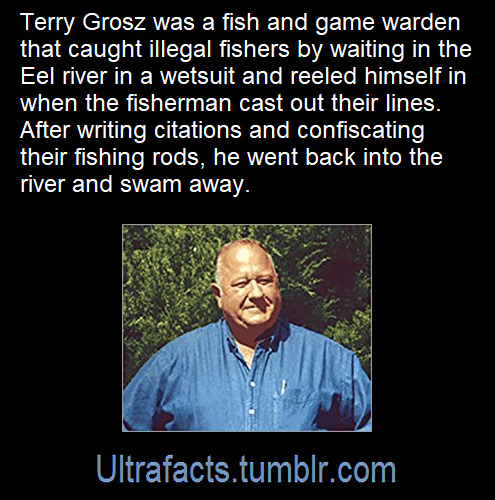
Source: [x]
Follow Ultrafacts for more facts!
#my late father#was a maine state fisheries biologist#at one time#he'd have loved this#fish and game wardens#fishing laws#game wardens
309K notes
·
View notes
Text
"For years, California was slated to undertake the world’s largest dam removal project in order to free the Klamath River to flow as it had done for thousands of years.
Now, as the project nears completion, imagery is percolating out of Klamath showing the waterway’s dramatic transformation, and they are breathtaking to behold.
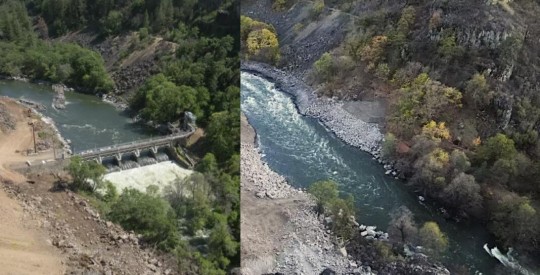
Pictured: Klamath River flows freely, after Copco-2 dam was removed in California.
Incredibly, the project has been nearly completed on schedule and under budget, and recently concluded with the removal of two dams, Iron Gate and Copco 1. Small “cofferdams” which helped divert water for the main dams’ construction, still need to be removed.
The river, along which salmon and trout had migrated and bred for centuries, can flow freely between Lake Ewauna in Klamath Falls, Oregon, to the Pacific Ocean for the first time since the dams were constructed between 1903 and 1962.
“This is a monumental achievement—not just for the Klamath River but for our entire state, nation, and planet,” Governor Gavin Newsom said in a statement. “By taking down these outdated dams, we are giving salmon and other species a chance to thrive once again, while also restoring an essential lifeline for tribal communities who have long depended on the health of the river.”
“We had a really incredible moment to share with tribes as we watched the final cofferdams be broken,” Ren Brownell, Klamath River Renewal Corp. public information officer, told SFGATE. “So we’ve officially returned the river to its historic channel at all the dam sites. But the work continues.”
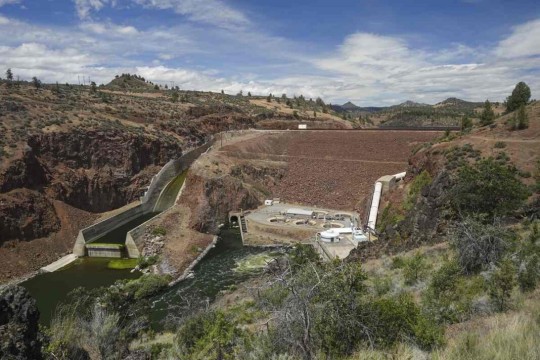
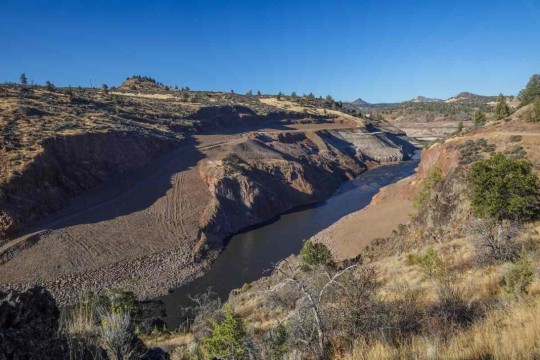
Pictured: Iron Gate Dam, before and after.
“The dams that have divided the basin are now gone and the river is free,” Frankie Myers, vice chairman of the Yurok Tribe, said in a tribal news release from late August. “Our sacred duty to our children, our ancestors, and for ourselves, is to take care of the river, and today’s events represent a fulfillment of that obligation.”
The Yurok Tribe has lived along the Klamath River forever, and it was they who led the decades-long campaign to dismantle the dams.
At first the water was turbid, brown, murky, and filled with dead algae—discharges from riverside sediment deposits and reservoir drainage. However, Brownell said the water quality will improve over a short time span as the river normalizes.
“I think in September, we may have some Chinook salmon and steelhead moseying upstream and checking things out for the first time in over 60 years,” said Bob Pagliuco, a marine habitat resource specialist at the National Oceanic and Atmospheric Administration in July.
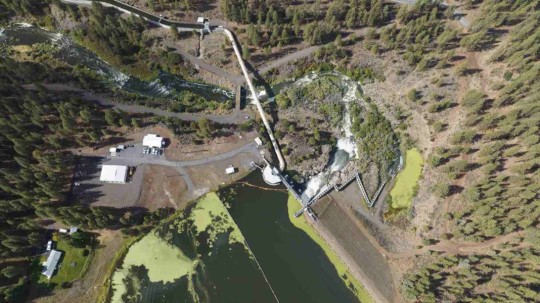

Pictured: JC Boyle Dam, before and after.
“Based on what I’ve seen and what I know these fish can do, I think they will start occupying these habitats immediately. There won’t be any great numbers at first, but within several generations—10 to 15 years—new populations will be established.”
Ironically, a news release from the NOAA states that the simplification of the Klamath River by way of the dams actually made it harder for salmon and steelhead to survive and adapt to climate change.
“When you simplify the habitat as we did with the dams, salmon can’t express the full range of their life-history diversity,” said NOAA Research Fisheries Biologist Tommy Williams.
“The Klamath watershed is very prone to disturbance. The environment throughout the historical range of Pacific salmon and steelhead is very dynamic. We have fires, floods, earthquakes, you name it. These fish not only deal with it well, it’s required for their survival by allowing the expression of the full range of their diversity. It challenges them. Through this, they develop this capacity to deal with environmental changes.”
-via Good News Network, October 9, 2024
#california#oregon#klamath river#dam#dam removal#yurok#first nations#indigenous activism#rivers#wildlife#biodiversity#salmon#rewilding#nature photography#ecosystems#good news#hope
6K notes
·
View notes
Text
Excerpt from this story from Smithsonian Magazine:
For the first time in 112 years, Chinook salmon are swimming freely in the Klamath Basin in Oregon.
On October 16, biologists with the Oregon Department of Fish and Wildlife (ODFW) spotted the fish above the former site of the J.C. Boyle Dam in the Upper Klamath River. The dam was one of four that had blocked the salmon’s migration between the Klamath Basin and the Pacific Ocean. Each of those dams was recently deconstructed in the largest dam removal project in United States history, which has restored the river to its natural, free-flowing state.
At first, biologists wondered if they had really sighted a salmon. “We saw a large fish the day before rise to surface in the Klamath river, but we only saw a dorsal fin,” says Mark Hereford, leader of ODFW’s Klamath Fisheries Reintroduction Project, in a statement. “I thought, was that a salmon, or maybe it was a very large rainbow trout?”
But when the team returned on October 16 and 17, they were able to confirm the fall-run Chinook—making them the first to spot the species in the region since 1912.
The return of the salmon comes less than two months after the end of the dam removals in California and Oregon, an effort that took decades of advocacy by the surrounding tribes—including the Yurok, Karuk, Shasta, Klamath and Hoopa Valley, among others—whose people have deep ties to the Chinook salmon.
Ron Reed, a Karuk tribe member and traditional fisherman, participated in the campaigns for dam removal, advocating that the river’s restoration would help salmon recover. He isn’t surprised the fish have returned so quickly to their ancestral waters, he tells the Los Angeles Times’ Ian James.
“The fact that the fish are going up above the dams now, to the most prolific spawning and rearing habitat in North America, it definitely shines a very bright light on the future,” Reed tells the Los Angeles Times. “Because with those dams in place, we were looking at extinction. We were looking at dead fish.”
In one poignant case, tens of thousands of Chinook salmon died off in the span of days in 2002, as the water quality in the dammed Klamath River deteriorated from the lack of flow. The dams, built between the early 1900s and 1962, also contributed to algae blooms and diseases, and they blocked the salmon’s annual migration.
3K notes
·
View notes
Text
All? Is that weird? I travel a lot for work in situations with limited space. if I've forgotten to load books on my Kindle the phone reader is a life-saver bc the Kindle needs WiFi to download the books. I also am a fast reader so if there's enough downtime I can run through multiple books in a week, bringing enough physical books for a 2 week trip gets very heavy very fast.
#ereader#books#ebook#libraries#rentebooksfromyourlibrary#findabookdump#profit#at sea fisheries biologist#some people are so fuckin snobby about only reading Real Paper Books#get fucked
5K notes
·
View notes
Text
Sharing this on behalf of a Marine Biologist friend, not my words.
Tumblr loves sea creatures, and this is important. Have a cool pic of an octopus before digging into this big post from someone who is in the trenches (but not the really deep ones like the Mariana):

"Hi all! I have a personal request for everyone!
I need you to write a letter/email. Please write your congressional representative in support of the value that your state (or state(s) you love) Sea Grant Program means to you personally. Please send a copy of your email/letter to your state Sea Grant director as well. I can tell you for a fact that these messages are critically important and do in fact make a difference.
If you do not want to write your representatives, please still write your Sea Grant directors.
Unsure about what/who the Sea Grant Programs are? The Sea Grant Programs were created specifically to connect science between local, state, and national needs. Sea Grants make sure up-to-date science is informing decisions made in our home states and regions. Each of the State programs conducts marine and coastal research, education, and outreach tailored to their regional needs. If you’ve ever been to the beach and seen rip current education signs, seen disaster readiness material, enjoyed a coastal natural area, enjoyed fishing, ate local seafood, have a military installation near you, and much more, you’ve been positively impacted by your state’s Sea Grant Program.
Economic Benefits: Sea Grant programs provide direct economic benefits contributing to job creation, industry resilience, and sustainable economic growth.
• Works with local businesses, tourism operators, and maritime industries to enhance profitability and ensure longevity of businesses.
• Supports jobs in fisheries, marine engineering, coastal construction, and tourism through workforce development, training programs, and fellowships.
• Provides technical assistance to commercial fishers, shipbuilders, and port workers, including development of new and innovative technology that improves entire industries.
Fisheries & Aquaculture: Sea Grant programs support seafood production and sustainable fisheries management to ensure the health of marine ecosystems and economies.
• Offers training on best practices for commercial and recreational fishers.
• Helps reduce bycatch and overfishing through gear modifications and conservation efforts.
• Advances shellfish farming techniques (e.g., oysters, mussels, clams) to boost seafood production while improving water quality.
• Provides resources to help small-scale aquaculture businesses thrive.
• Monitors seafood safety and waterborne diseases to protect public health.
• Conducts research on invasive species like zebra mussels, lionfish, and green crabs; and, develops early detection and removal strategies to prevent ecological and economic harm.
Public Safety & Community Resilience: Coastal communities face unique challenges, from hurricanes and flooding to rising sea levels and water pollution. Sea Grant programs work to keep people safe through risk mitigation, education, and emergency preparedness.
• Helps communities create hurricane evacuation plans and build disaster-resilient infrastructure.
• Provides flood mapping and modeling to predict storm surges and coastal erosion.
• Develops tools like real-time weather alerts and emergency response strategies.
• Monitors pollution levels in oceans, rivers, and lakes to ensure safe drinking water.
• Identifies and mitigates harmful algal blooms (like red tide) that threaten human and marine life.
• Leads efforts to reduce plastic pollution in oceans, including microplastics research.
• Runs community beach cleanups and educational programs on waste reduction.
• Helps coastal communities upgrade ports, harbors, and public infrastructure to withstand extreme weather.
• Promotes nature-based solutions (e.g., living shorelines) to prevent coastal erosion and property damage.
• Partners with local governments to design smarter zoning laws for flood-prone areas.
Military Readiness & National Security: Sea Grant programs help ensure the safety and effectiveness of naval operations, coastal military installations, and maritime security.
Protecting Naval Bases & Infrastructure
• Assists military installations in climate resilience planning to prepare for sea-level rise and extreme weather.
• Works on coastal erosion control to protect bases and training grounds.
• Supports advancements in sonar, remote sensing, and underwater drones for naval and marine research.
• Provides oceanographic data crucial for submarine navigation and surveillance.
Education & Workforce Development: Sea Grant invests in the next generation of scientists, engineers, and marine professionals.
• Supports STEM (Science, Technology, Engineering, and Math) education focused on marine science.
• Provides internships and fellowships for students pursuing marine research careers.
• Runs public engagement programs to promote environmental stewardship.
• Helps local governments understand disaster preparedness, flood management, and coastal zoning laws.
State & Regional Sea Grant Programs
East Coast and Caribbean
• Connecticut Sea Grant – University of Connecticut, Director: Sylvain De Guise ([email protected])
• Delaware Sea Grant – University of Delaware Director: Joanna York ([email protected])
• Georgia Sea Grant Director: Mark Risse ([email protected])
• Maine Sea Grant – University of Maine, Director: Gayle Zydlewski ([email protected])
• Maryland Sea Grant – University of Maryland Director: Fredrika Moser ([email protected])
• Massachusetts Institute of Technology Sea Grant – Director: Michael Triantafyllou ([email protected])
• (Massachusetts) Woods Hole Oceanographic Institute Sea Grant – Director: Matthew Charette ([email protected])
• New Hampshire Sea Grant – University of New Hampshire Director: Erik Chapman ([email protected])
• New Jersey Sea Grant Consortium
• New York Sea Grant – Cornell University & SUNY Director: Rebecca Shuford ([email protected])
• North Carolina Sea Grant – NC State University Director: Susan White ([email protected])
• Pennsylvania Sea Grant – Director: Sarah Whitney ([email protected])
• Puerto Rico Sea Grant – Director: Ruperto Chaparro Serrano ([email protected])
• Rhode Island Sea Grant – University of Rhode Island Director: Tracey Dalton ([email protected])
• South Carolina Sea Grant Consortium Director: Susan Lovelace ([email protected])
• Virginia Sea Grant – Virginia Institute of Marine Science Director: Troy Hartley ([email protected])
Great Lakes Region
• Illinois-Indiana Sea Grant – University of Illinois & Purdue University Director: Tomas Höök ([email protected])
• Michigan Sea Grant – University of Michigan & Michigan State University Director: Silvia Newell ([email protected])
• Minnesota Sea Grant – University of Minnesota Director: John Downing ([email protected])
• New York Sea Grant – Cornell University & SUNY Director: Rebecca Shuford ([email protected])
• Ohio Sea Grant – Ohio State University Director: Christopher Winslow ([email protected])
• Pennsylvania Sea Grant – Director: Sarah Whitney ([email protected])
• Wisconsin Sea Grant – University of Wisconsin Director: Christy Remucal (Interim Director) ([email protected])
Gulf of Mexico
• Florida Sea Grant – University of Florida Director: Sherry Larkin ([email protected])
• Louisiana Sea Grant – Louisiana State University Director: Julie Lively ([email protected])
• Mississippi-Alabama Sea Grant Consortium Director: LaDon Swann ([email protected])
• Texas Sea Grant – Texas A&M University Interim Director: Laura Picariello ([email protected])
West Coast and Pacific
• California Sea Grant – Scripps Institution of Oceanography, UC San Diego Director: Shauna Oh ([email protected])
• University of Southern California Sea Grant – Director: Karla Heidelberg ([email protected])
• Oregon Sea Grant – Oregon State University Director: Karina Nielsen ([email protected])
• Washington Sea Grant – University of Washington Director: Kate Litle (Interim Director) ([email protected])
• Alaska Sea Grant – University of Alaska Fairbanks Director: Ginny Eckert ([email protected])
• Hawai‘i Sea Grant – University of Hawai‘i at Mānoa Director: Darren Lerner ([email protected])
• Guam Sea Grant – University of Guam Director: Austin Shelton ([email protected])
Please, if you love the sea critters, do this!! You know this website owes so much to the crabs.
16 notes
·
View notes
Text
🪨Venture (OW II) x (gn) reader ⛏️
(Marine Biologist Reader Edition!)

(Request here! Another unique one! You guys are so creative istg!)
- Very supportive and enthusiastic when it comes to your job, helping you whenever they can.
- They may not know as much as you but they do what they can for you, though their specialty is archeology they definitely dabble in paleontology and will talk extensively about the various ties to marine life to differing fossils.
- They gladly listen to you in the same way, may not remember every little thing but they record whatever they can alongside various notes about how cute you were as you got excited as you spoke.
- Happy to be your test audience when it comes to ways you can educate anglers and fisheries on better fishing strategies or putting emphasis on Marine conservation.
- If you become a part of Overwatch, they're over the moon about it, immediately introducing you to them, especially Mei due to your shared concerns over conservation.
- Makes so many puns about your occupation, the more they learn the more inventive the puns are.
- Thinks what you are doing is very noble, and tells you how proud they are of you for making the effort to make the life of our underwater friends more habitable.
- Helps you with research to do a degree, probably acting as a kind of editor, looking over various papers.
- The amount of Marine life-based items you get from them is insane, you have your side of various things and they have their own in your shared home— Which kind of melds in the middle for one reason or another.
- Your sense of leadership and management for projects and regulations is so fascinating to them, your proposals to get funding are always backed up by them via emotional support.
- They know fully well how demanding your job is, knowing the importance of making people aware of what humanity is doing to marine animals and their environment so when you’re too busy to do something with them they don’t mind postponing things.
- They know if the tables were turned (which they really can be when it comes to their occupation), you’d do the same for them.
- If you guys met before you got your degree, they eagerly encourage you to pursue the excessive amount of education when it comes to that line of work— Dependable whenever they can be.
- Much like archeology, both have a level of risk, marine biology even more so due to it requiring lots of physical exertion and the handling of heavy machinery, so they obviously always try to be as careful as they can for your sake and they hope you can be as well.
- They love knowing that you guys are side by side making an impact on the world with your shared interests and intelligence accumulated.
- Thinks you guys are a formidable duo, a team that helps one another to be as best you possibly can be.
- You both have very demanding jobs so hanging out with one another may be few and far between but whenever you two do it’s always something special.
- Makes a point to tell you to take care of yourself when things become too much, providing comfort when it is needed— Whether it be physical or verbal.
- Almost always asks for photos and videos of you venturing (ba dum tiss) under water, especially silly photos of your adventures being framed and put in the wall alongside your shared degrees and certificates.
- Despite how both of your jobs keep you both busy and apart, it bring you both together emotionally more than anything, the shared passion for both careers providing a sense of understanding.
(Here!! So so sorry making you guys wait this damn long! :(( Happy Friday the 13th!!!)
#overwatch 2#overwatch x reader#venture overwatch#venture ow2#venture x reader#sloane cameron#Spotify
33 notes
·
View notes
Text




my slimy homie glurg
glurg has a deformity called “pugheadedness” , but he is otherwise healthy & happy :)
#largemouth bass#he is deformed :(#nature#wildlife#fisheries#lake fish#native fish#freshwater fish#fishing#fishblr#fish#wildlife photography#field biologist#biology
36 notes
·
View notes
Text
Digression @freshgratednutmeg: If it comes to bear vs moose, I take moose.
Not that moose aren't dangerous -- they certainly can be -- but in general, if you can get a fair sized tree between them and you, you're OK
(That said, if I had encountered a moose on a run around a lake, I would have reversed course, too. (Gingerly.))
i am reminded, my coworkers were discussing "would you rather be alone in the woods with a man or a bear" and i was experiencing Complete Perplexment cause they were like "I would pick the bear" and then I learned this was a whole internet Thing, where women were saying they would rather be alone with a Bear than a random human man, and I was like okay first of all, the status of wildlife education in this country is truly pitiful.
but second, are you telling me that if you were stranded in the wilderness and you saw a bear and in the opposite direction you saw a man coming towards you, you would run from the human person and go TOWARDS the wild bear?
#my dad was a state fisheries biologist in the state of maine#saw a fleet jeep that had been totaled by a charging moose#jeep looked like a crumpled beer can#moose strolled away#have encountered moose twice myself#both times#got behind a tree and waited for it to leave#moose#bear#man#hiking#dangerous wildlife
3K notes
·
View notes
Text
Animal Crossing Fish - Explained #246
Brought to you by a marine biologist with some recent history...
CLICK HERE FOR THE AC FISH EXPLAINED MASTERPOST!
Look - all sharks are cool. They're the reason I became a marine biologist. Even now, in my 30s, I am still fascinated with them and their diversity and their mystery. Today's shark really exemplifies both of those things as it is a deep sea weirdo, but perhaps the most mysterious of them all. AC Pocket Camp gave us the Megamouth Shark!

I gotta tell ya, my eyebrows were in my hairline when I was checking to see if ACPC had given us any new fish since I last left off with this series. Not only did they do the frilled, but the megamouth, too?! Holy shit. It was available for the Deep Sea Shark goals in July 2023 for a measly 4 day stint and it was tier 4 RARE. (Honestly it should have been Tier 5, but I understand in a game something has to give.) If ACPC plays on the accurate rarity, though, this guy should never ever show up in the game again. In real life, that's how rare these are and I'm gonna get a little more history than biology here in a moment, but you know I gotta do the taxonomy.
The Megamouth (Megachasma pelagios) is a large shark in the Order Lamniformes, the mackerel sharks, meaning that of all the sharks in the AC franchise, it's most closely related to the Great White and the Smalltooth Sand Tiger. Which is so mind boggling because those sharks, and most of Lamniformes, are amazingly modern, fast, active sharks and the Megamouth...isn't. In fact it spends its life in the slow lane, taking basically all day and night to make its vertical migrations to the surface at night and back down to depth in the day time. This is a big shark though - it can grow to be 17 feet or a little over 5 m, we think - so it doesn't really have to be doing that to avoid predators. Instead, it's a filter feeder simply following its planktonic food up and down the water column. The Megamouth is in its very own family all by itself - Megachasmidae.
I don't think I'm a fan of the ACPC sprite and I'm allowed, considering how accurate some of them have been. They got the head shape right and all the fins, but. The megamouth has teeth, but they are tiny and I just don't think they needed to be in the sprite. It makes it look toothier than it really is. The eye is actually really accurate, though, so I will give credit - someone was looking at pictures of this thing and doing their best.

But what I really want to focus on is the fact that it hasn't been very long that we've known this thing existed. The very first specimen was captured, by accident, by the US Navy off Hawaii in 1976. For some of you whose birth years start with a "2", I get it - that seems like eons ago, but it really isn't. I'll be 35 this year. My PARENTS, NOT my grandparents, are a decade OLDER than our collective knowledge of the Megamouth shark. And this thing isn't small. It's not every day that we discover a new species this big and not need DNA to say "Oh, yeah, that's different." This discovery was about as sensational as the discovery of the (living, extant) coelacanth.
And since its discovery, less than 300 megamouths have been seen (these being official sightings...the sharks seem to be regularly encountered in fisheries off Taiwan, so many probably go unreported *sigh*). Many of those were dead, but with targeted scientific capture, many more are being studied alive and are tagged. I know 300 sounds like a lot, but that is actually so few that each of these sightings and captures have been recorded. Sharkmans-World.org seems to be keeping the most up-to-date records of this that I could find, so check that out for photos and videos of the specific specimens. For some more in-depth reading on the specimens, check out the Florida Museum's website. The write-up for the very first specimen in 1976 by Hugh Gallagher (all the way down at the bottom) is a great read and also hilarious. Please take the time to read it - it's everything you could ever want in a 70's at-sea US Navy tale.
And there you have it. Fascinating stuff, no?
#megamouth shark#sharks#animal crossing#fish#animals#marine biology#science in video games#animal crossing fish explained
20 notes
·
View notes
Text
A huge fish in the Mekong River thought to be extinct has been spotted three times in recent years. “The giant salmon carp is like a symbol of the Mekong region,” said Chheana Chhut, a researcher at the Inland Fisheries Research and Development Institute in Phnom Penh, Cambodia. The predatory fish can grow up to 4 feet in length, and has a conspicuous knob at the tip of its lower jaw. A striking patch of yellow surrounds its large eyes. With the last confirmed sighting in 2005, “this species of fish seems to have disappeared from the Mekong region for decades,” said Chheana, who is a co-author of a study published online Monday in the journal Biological Conservation that documents the recent sightings. Since 2017, biologists tracking migratory fish species in Cambodia have developed relationships with local fishing communities, asking them to alert any unusual sightings. That’s how the three giant salmon carp found in the Mekong River and a tributary in Cambodia between 2020 and 2023 came to the attention of researchers.
13 notes
·
View notes
Note
Do you have specific locations in mind when you write about Panem? For example, is 12 in a particular part of Appalachia for you, etc? I can't tell from Katharsis (which, don't worry about that, because trust me, it says way more about my geography skills than your writing skills lol) so I was curious!
Ahoy, sweet reader!!! Thank you so much for asking this, because it touches on something I have been thinking about more this year. And bear with me, I'm gonna go off a minute, and it will veer more towards Four.
First, let's look at the movie!official map.
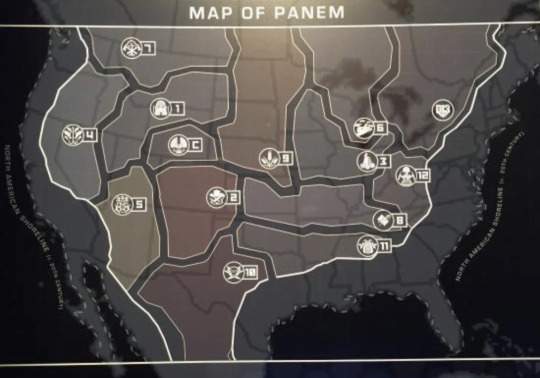
Something that has always bothered me about this is the size and proximity of the Districts. There are some, particularly Nine, Ten, and Eleven, that we can infer or were described as taking up more land. For their industries, they must. However, it is noted that most Districts' populations and economic centers are concentrated in singular towns. In those geographically larger Districts, workers may be shuttled between home and work sites, but there is a limit to how far that can stretch. Two is noted to be the odd one out with its multiple villages. So, given that we know the Districts do not actually take up this kind of space, that there are miles and miles of wilds between their borders, it is really just a display of potential ranges.
I always imagined Twelve in the northern Appalachians, a little east of this map, since I wasn't accounting for as much sea level rise. I like having Thirteen further north, nearer old Canada, to incorporate a wider range of North America, and a Twelve in the northern part of the mountains lets us have that without them being too far for the commutes in Mockingjay. In Ch. 16, I said Buttercup "trekked hundreds of miles," and to get that, I mapped West Virginia to New York. Not super precise. When she gathers herbs in Ch. 9, I did double check their current ranges and preferred growing habitats to try to be accurate. Northern creep explained by climate change. Coming up, they will eat some wild boar. Feral swine are a big nuisance in the south, and they can get up to the range depicted for Twelve. May even spread further with such a decrease in urban environments, but I'm not a terrestrial biologist. Here, the range for Twelve is smaller than the other Districts, and I don't have a more specific headcanon aside from being biased for the bit closer to Pennsylvania.
Now, being a Chicago gal, I do appreciate its inclusion at the tip of District 6. It's where the transcontinental railroad connected and has historically been the intersection of many a terrestrial trade route--and big about trains--thanks to the Great Lakes! To me, Six is there, and they still use old railway paths and the lakes for moving things, even if there isn't much in the direction the lakes lead anymore. No idea why Three would be there; I used to headcanon that as somewhere in California like Silicon Valley or wherever those people moved after it was eaten by the sea. Three should be closer to Five, which is very appropriately placed where solar panels will get a lot of action.
So, about District 4. When I first read the books, if I thought about seafood in the US, I thought about Bubba from Forrest Gump and all the glorious ways he enjoyed shrimp. This led my first thought about District 4 to the Gulf of Mexico. Later, the West coast grew on me, but Southern Four will always have a place in my heart. And that connects to my next point. Let's talk about Aquaculture!
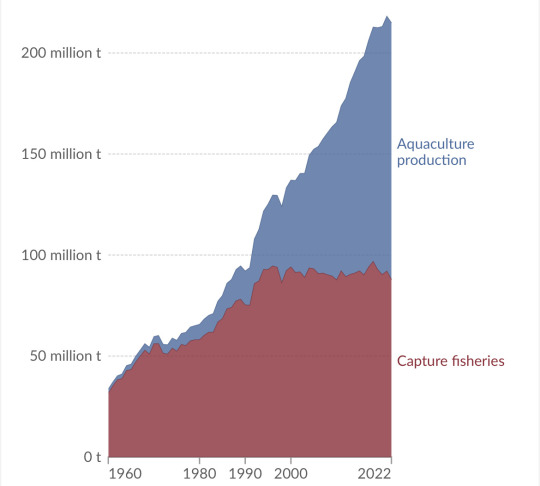
This figure represents world-wide industry and our current environment, so we must take it with a grain of salt to extrapolate to Panem. That said, I do believe that Four does a combination of wild capture and aquaculture. Wild fisheries could be completely depleted for all we know! Aquaculture is the way of sustainability, and I can go on about that for hours. BUT do you know what the top-cultured aquatic species in the US is today? Catfish!
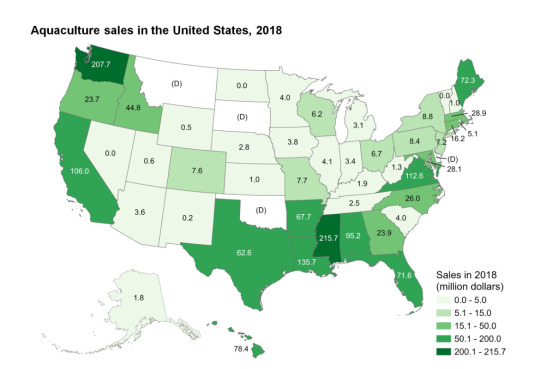
This map is shows the profit of catfish and other freshwater species like bass and tilapia in the South. If we roll with Four being on the West coast, then I will always put it in the northern part of that. Note the shade of Washington. That's salmon and trout! Salmonids and other prized seafood species are cold water animals! They also do a fair amount of salmonid aquaculture in Idaho. I do not buy a Californian District 4. Not with the way the waters are warming. There is so much salmonid aquaculture up that coast into Canada, too! And the "Yellow Death" that Four's trout hatchery scientists make a new vaccine for in Katharsis Ch. 11 is a Flavobacterium sp.
Anyway, thanks for asking!!!
7 notes
·
View notes
Text
Good News - May 1-7
Like these weekly compilations? Support me on Ko-fi! Also, if you tip me on Ko-fi, at the end of the month I'll send you a link to all of the articles I found but didn't use each week - almost double the content!
1. New study says conservation works, providing hope for biodiversity efforts
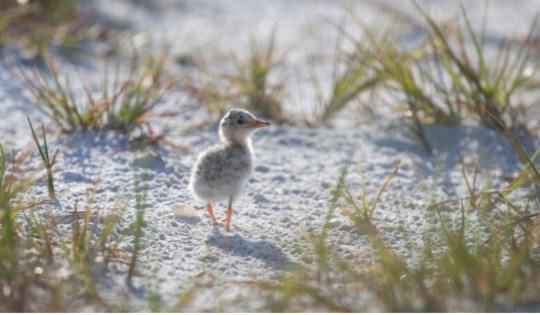
“A new study published in Science reveals that conservation works, with conservation actions improving or slowing the decline of biodiversity in two-thirds of the cases analyzed.”
2. Monk Seal Pup Debuts in Waikīkī on Lei Day
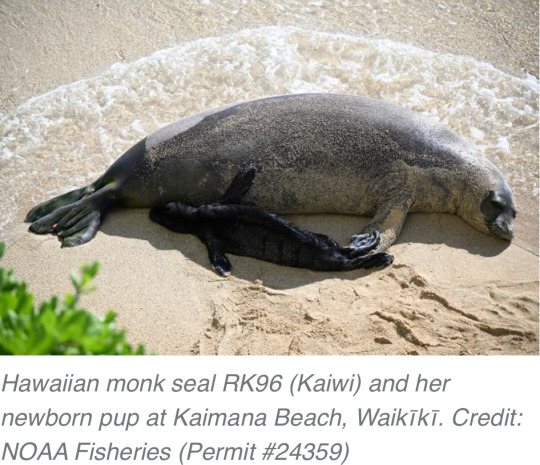
“Endangered Hawaiian monk seal RK96 (Kaiwi) gave birth to her sixth pup on popular Kaimana Beach in Waikīkī, Oʻahu! […] Hawaiian monk seals are one of the most endangered seal species in the world, so each pup represents hope for the species’ recovery.”
3. West Coast Indigenous-led marine conservation area gets global spotlight
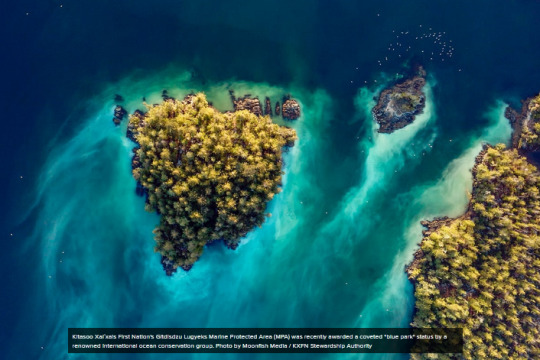
“A coastal First Nation is celebrating global recognition of its marine protected area after recently snagging a “blue park” designation that highlights exemplary ocean conservation efforts around the world. […] Kitasu Bay supports one of the last abundant herring spawns along the central coast, vital to the nation’s communal herring roe on kelp (ROK) fishery - which harvests the protein-rich eggs but leaves the fish alive to flourish and spawn again.”
4. The number of fish on US overfishing list reaches an all-time low. Mackerel and snapper recover
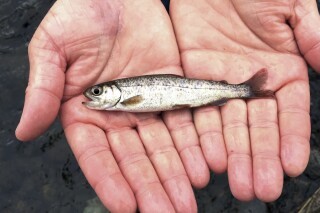
“The report states that 94% of fish stocks are not subject to overfishing, which is slightly better than a year ago. The U.S. was able to remove several important fish stocks from the overfishing list, NOAA said in a statement. […] The removal of species from the overfishing list shows the U.S. is making progress, said Rick Spinrad, NOAA’s administrator.”
5. Researchers Collaborate with the Shipping Industry to Cut Costs, Fuel Consumption and Greenhouse Gas Emissions in Shipping
“Through coordinated ship scheduling and an optimisation of ship operations and port services, the objective is to achieve a substantial increase in energy efficiency and a 10-20% reduction in fuel consumption, consequently resulting in lowered greenhouse gas emissions [and] leading to substantial economic benefits for shipping and environmental advantages for society[….]”
6. The city flower farm that is changing lives
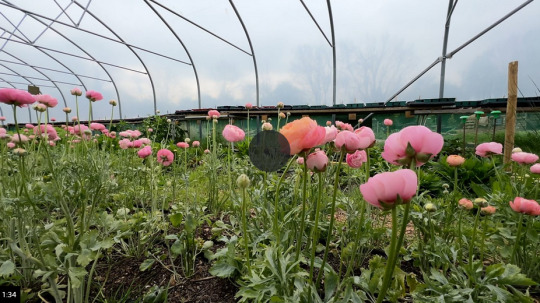
“Heart of BS13 Flowers in Hartcliffe is part of the wider Heart of BS13 charity which tackles food insecurity in south Bristol. Profits from the flower sales to run workshops, offer volunteer and trainee placements, and create education opportunities for people from Hartcliffe.”
7. Four falcon chicks hatch in Glasgow university tower
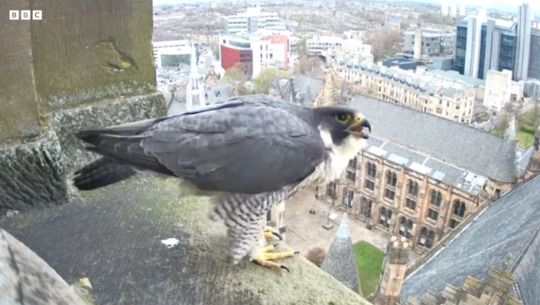
“Members of the [Glasgow Peregrine] project hope to […] fit [the chicks] with electronic tags that will enable monitoring of their movements. Mr Simpson added: "With the identification tags we can see where they have gone, how high they fly and other information that would be really useful." In recent years the group have held peregrine watches at the university, allowing people to see the birds in their nest.”
8. 'Banana pingers' are saving whales and dolphins around the world
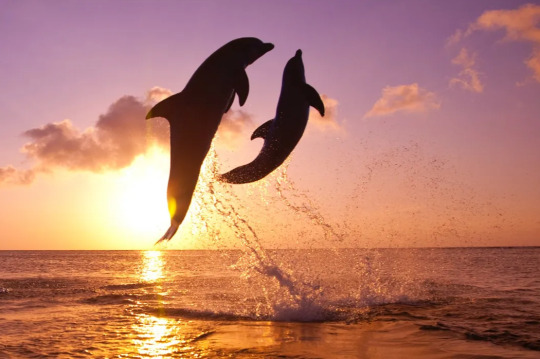
“[T]he Kibel brothers, Pete (a fisheries biologist) and Ben (an engineer) […] have been utilising light to protect turtles, sound to protect porpoises and electro pulses to protect sharks. [… Trials] showed reduced average catch rates of blue shark by 91%, and catch rates of pelagic stingray by 71% […as well as] a fall in the number of sea turtles being trapped by 42%.”
9. New vaccine effective against coronaviruses that haven't even emerged yet
“Researchers have developed a new vaccine technology that has been shown in mice to provide protection against a broad range of coronaviruses with potential for future disease outbreaks -- including ones we don't even know about. […] The new vaccine works by training the body's immune system to recognise specific regions of eight different coronaviruses, including SARS-CoV-1, SARS-CoV-2, and several that are currently circulating in bats and have potential to jump to humans and cause a pandemic.”
10. Grassland birds, Forest birds and Other Migratory Birds to Benefit from More Than $22 Million in Funding Throughout the Americas
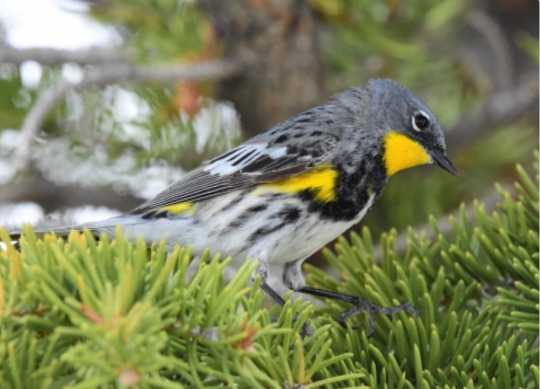
“This year, more than $4.87 million in federal funds will be matched by more than $17 million in partner contributions going to 30 collaborative conservation projects in 19 countries across the Americas. “These investments will [… protect] millions of acres of diverse habitats needed by grassland birds, forest birds and shorebirds for wintering, breeding and migration,” said Service Director Martha Williams.”
April 22-28 news here | (all credit for images and written material can be found at the source linked; I don’t claim credit for anything but curating.)
#good news#hopepunk#sorry its late i got distracted lol#biodiversity#conservation#seal#monk seal#hawaiʻi#oahu#first nations#fish#noaa#shipping#climate change#greenhouse gasses#ships#flowers#falcon#glasgow#university#peregrine falcon#birds#whale#dolphin#shark#turtles#vaccine#coronavirus#health#animals
21 notes
·
View notes
Text

This map was compiled by Laney Hanzel who was a board member of Flathead Lakers (a conservation organization) and a former fisheries biologist. The map features over 100 sightings of strange encounters in the Montana lake. The Flathead Lake Monster, lovingly called Flossie by some, has been seen since 1889. While there are generally a couple sightings a year, the busiest year by far was 1993, where 13 sightings of the Flathead Lake Monster took place. Generally, the creature is 20 to 40 feet in length and described as "eel-like". Others claim that Flossie is just a large fish, usually 10 feet in length.
17 notes
·
View notes